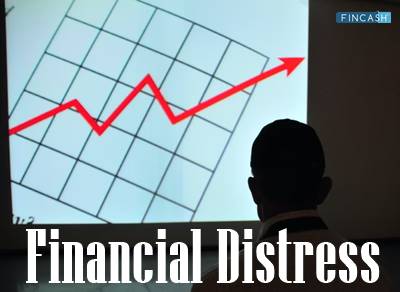
Table of Contents
What is Financial Distress?
Financial distress is a circumstance under which a firm or person does not earn enough revenues or Income, which prevents it from fulfilling its financial obligations or from paying them. This is usually owing to high fixed costs, a significant volume of Illiquid assets, or economic downturn-sensitive revenues.
Individuals suffering from poor budgeting, excessive expenditures, a large debt burden, legal proceedings, or loss of jobs are considered to be dealing with financial distress. It might be catastrophic to ignore the indications of financial hardship before its removal.

Sometimes serious financial distress cannot be rectified any longer because the company or individual's Bonds have grown too big and cannot be reimbursed. Bankruptcy might be the only option left to finally incur the cost of financial distress.
Financial Distress Understanding
If an individual or organization is unable to pay its debts, bills, and other commitments until its due date, financial distress is likely to occur. The financing of a company can involve the payment of interest on debts, the cost of opportunity of projects and non-productive staff, etc.
For financially distressed enterprises finding out new funding could become more difficult. Moreover, if the Market value of any company declines considerably, consumers reduce making new orders, and thus the suppliers are forced to adjust their delivery terms to maintain the sales.
Looking at the financial accounts of the company can enable investors and others to determine their financial health today and in the future. For instance, a red sign of financial hardship is the negative cash flows in the company's cash flow statement. This can be due to a large difference between cash and claims, excessive interest payments, or a decrease in working Capital.
Talk to our investment specialist
Corporate Financial Distress
Even a well-managed company can easily experience a time of financial crisis. It is because there might be financial trouble for numerous reasons, some of which could be uncontrolled. For instance, a sudden, unexpected economic downturn may result in a significant decrease in a company's income.
With the emergence of the COVID-19 pandemic, as a result of quarantine and lockdown conditions, many brick-and-mortar stores that had previously had a high, steady revenue throughout the years had suddenly seen their revenue go to nil.
A substantial loan with an adjustable interest rate could have come from a firm. In such circumstances, a considerable increase in interest rates might dramatically increase the cost of repaying the company's loans and cause financial troubles.
Of course, the financial difficulty of a corporation is often caused by managerial failings. Top managers can also extend the organization’s finances by borrowing money. If the money borrowed does not bring rapid growth in revenues and Earnings, the company starts struggling to satisfy its debt payments.
Bad marketing or price decisions can also contribute to a company’s financial difficulties. Other potential causes of financial trouble include a costly publicity effort that does not succeed, inefficient modifications of products, price structure that led to the loss of sales, and much more. Even the most successful companies can make such mistakes. Inadequate budgeting, failure to promptly recover accounts Receivables, and poor Accounting are other potential causes of financial difficulty.
The most typical cures for financial difficulty include cost reduction, better cash flow or income, and debt restructuring aiming at a reduction in debt payments.
Individual Financial Trouble
As many people suffer financially with low- or no-savings salaries, it is quite easy for a person to have financial misfortune. Like in organizations, the financial difficulty of an individual might be caused by his poor financial management or by no fault of his. Below are some of the most frequent types of financial distress reasons for personal cases:
Income lost or decreased: Everybody can experience a sudden decrease in income. You can be fired or dismissed unexpectedly, or the business you work for may leave you unemployed suddenly. You might have to consider a larger pay cut from your job due to a severe economic crisis or other circumstances. If you don't have savings, you would have to fight to pay for your essential costs, including the utilities, rent, and food.
Unforeseen spending: Another major source of financial issues is large, unanticipated costs, such as hefty medical bills or expensive car repairs.
Divorce: Divorce is among the most common and serious causes of economic suffering. Indeed, the burden of divorce generally lies on both partners.
Not managing your finances appropriately: Even high-income individuals are unable to Handle their money well if they end in financial hardship. Expenses may rise, like credit card bills, and a person will suddenly have financial difficulties. Your money must always be meticulously budgeted.
All efforts have been made to ensure the information provided here is accurate. However, no guarantees are made regarding correctness of data. Please verify with scheme information document before making any investment.












